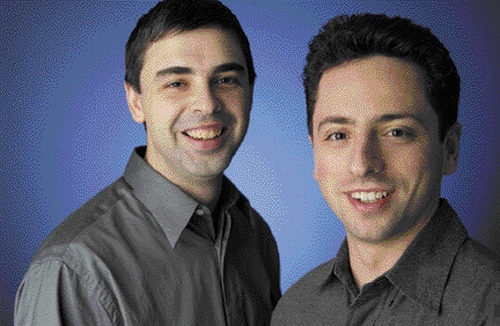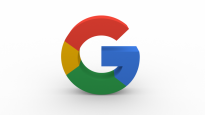Google history. Larry Page and Sergey Brin.
06.12.07 Back then, in 1995, no one could have imagined that the idea of two Stanford doctoral students would turn into something serious, and most importantly, profitable. For Larry and Sergei, their business was simply an academic hobby, on which they wrote several scientific papers. There was no thought about income or any business plan. But even without the latter, the then graduate students managed to receive 100 thousand USD. The mysterious investor turned out to be Andy Bechtolsheim, one of the founders of Sun Microsystems, a wealthy man even then who believed in the promise of Internet technologies.
Back then, in 1995, no one could have imagined that the idea of two Stanford doctoral students would turn into something serious, and most importantly, profitable. For Larry and Sergei, their business was simply an academic hobby, on which they wrote several scientific papers. There was no thought about income or any business plan. But even without the latter, the then graduate students managed to receive 100 thousand USD. The mysterious investor turned out to be Andy Bechtolsheim, one of the founders of Sun Microsystems, a wealthy man even then who believed in the promise of Internet technologies.
First terabyte
However, the investments came much later. While it was 1995, Larry Page and Sergei Brin had just met. Even then, there were already several search engines on the market, so there was no one to compete with. But none of those developments produced sufficiently relevant results, which means there was something to strive for. And the future doctors of science got to work. Two years later, the first results of their work appeared – Google became the internal search engine of Stanford University and was available at googol.stanford.edu.
The name (Googol) was invented quickly. In mathematics, this term means one followed by a hundred zeros. In the understanding of Page and Brin, it was supposed to symbolize the infinity of information. In the same 1997, the future mega-corporation received its first financial injections in the amount of 15 thousand USD. All the money came from the pockets of its founders, Larry and Sergei. With this amount, the guys bought hard drives with a total capacity of as much as 1 terabyte. Just think, today you can buy hundreds of TBs for this money.
But the friends wanted to create an infinitely large database (by the way, their desire has not changed to this day), and for this they needed infinitely large storage facilities. 1 TB seemed about that then. In 1998, the guys were so captivated by their idea that six months before defending their doctorate, they left the institute and began to work exclusively with the corporation. In the same year, they met Andy Bechtolsheim (the very first investor), who, in addition to money, gave them some more valuable advice. One of which was to register a company.
But the co-founder of Sun Microsystems wrote out the check before the company was registered, and in the “Recipient” column he wrote Google instead of Googol. According to state law, this check could only be paid to Google. I didn’t want to lose money, but I wasn’t sure that I would be able to get such a check again. It would have been easier to change the name. So the fate of the company was decided – a registration certificate was received in the name of Google.
Your way
One hundred thousand certainly helped the development of the business. Business has grown stronger, search has become even more efficient. It’s time to sell your product. George Bell, CEO of Excite, was considered as a potential buyer. But Larry and Sergei’s hopes are not justified. Bell not only shows no interest in the system, but also expresses the idea that the search itself no longer interests the user. He, the user, already needs a set of additional services: mail, news, entertainment, and his, Bella, company will develop in this direction. Page and Brin left Bell’s office and went…their own way.
Unlike their potential competitors, the founders of the search engine did not waste money on advertising; contrary to the laws of the market, they were not spent on promotion. Instead, they simply bought a few more computers to increase production capacity. This “ad-free” strategy bore fruit quite quickly, and by the beginning of 1999 the system was processing 500 thousand requests per day. But a year later this figure reached one hundred million. Surprisingly, at that time, hundreds of thousands of requests per day were processed not by powerful servers, but by ordinary home computers built on the Micintosh platform. The most interesting thing is that some of the work machines are still presented in the form of ordinary PCs, which are supplemented by four thousand real “servers”.
What does Playboy have to do with it?
Google grew and developed. Literally in 2004, the question of the capitalization of the enterprise first arose. The smart idea came from Andy Bechtolsheim, the same one who, nine years ago, was the first to believe in young enthusiasts and the first to invest in the company. Larry and Sergei liked the idea of listing their shares on the stock exchange. Google at that time was already a developed, well-established corporation; its securities should have quickly taken the first line of the ratings. But the New York stock exchange refused.
It cannot be said that Brin and Page were upset, but when they learned about the reason for the refusal, they simply laughed. It turned out that on the eve of the start of trading, representatives of participating companies were prohibited from making public statements. And the guys managed to give an interview to the magazine. In Playboy. Despite the first unsuccessful experience, the second was quite successful, and within a year the capitalization of the enterprise amounted to more than 100 billion USD. Moreover, due to their habit, Larry and Sergey again did not develop any business plan or stock exchange strategy. And again they were right. In this regard, American teenagers even have the expression “doing Google”, which means earning a lot of money as if by accident, relying on luck.
Liberties at Google
For several years in a row, according to authoritative research services, Google has been considered the best employer in the world. High salaries, a young team passionate about their work, an above-average social package… What more could you ask for? Google’s social package deserves special attention. In addition to the standard set of insurance, vacation and thirteenth salary, company employees receive a lot of rights and privileges. Every Saturday everyone gathers in the corporate parking lot to play roller hockey.
Breakfasts and lunches for all Googlers are prepared by specially invited chefs from the most luxurious restaurants in the world. In addition, people are allowed to do their own thing for 20% of their working time. According to Brin and Page, it is at this time that their subordinates come up with the most brilliant ideas for business development and service improvement. But the most surprising Google liberty is that employees are allowed to take their pets with them to work. Thus, dogs, cats, rats and even domesticated cockroaches are running around the office in Silicon Valley.
In the future, Larry and Sergey are betting not only on improving search, but also on personalizing it. For example, when requesting “mouse,” the system, based on the topics of previous requests, will itself decide where to take the user, to a page for rodent lovers or to a computer site. This technology is already being tested and is expected to be available to everyone soon. In addition, it is planned to “link” the search to a person’s location: for a request, say, “Hard Roch Café”, the search engine will give different results to different users.
Web-droid editor
Don't miss interesting news
Subscribe to our channels and read announcements of high-tech news, tes
Oppo A6 Pro smartphone review: ambitious

Creating new mid-range smartphones is no easy task. Manufacturers have to balance performance, camera capabilities, displays, and the overall cost impact of each component. How the new Oppo A6 Pro balances these factors is discussed in our review.
Oppo Reno 15 5G smartphone review: confident

The Oppo Reno15 smartphone emphasizes design, a high-quality display, versatile cameras, and good battery life. Let’s take a closer look.
Samsung Galaxy S26 512GB version will be available in Ukraine cheaper events in Ukraine Samsung smartphone
Samsung is betting on a proven strategy: pre-orders get double the storage at no extra cost.
Chery unveils diesel plug-in hybrid car
Chery held the Australian premiere of a pickup truck concept with a plug-in hybrid powertrain based on a diesel engine.






